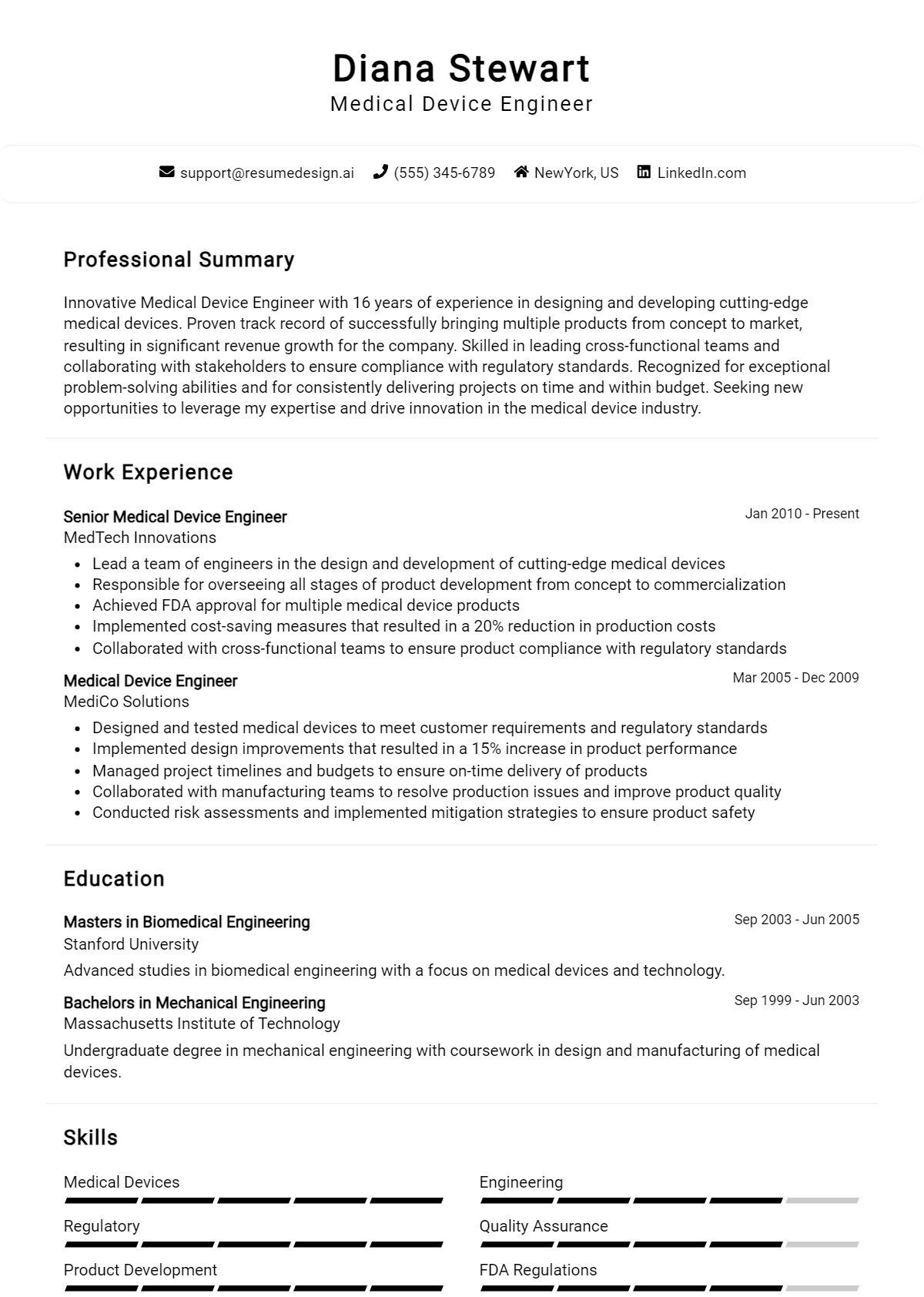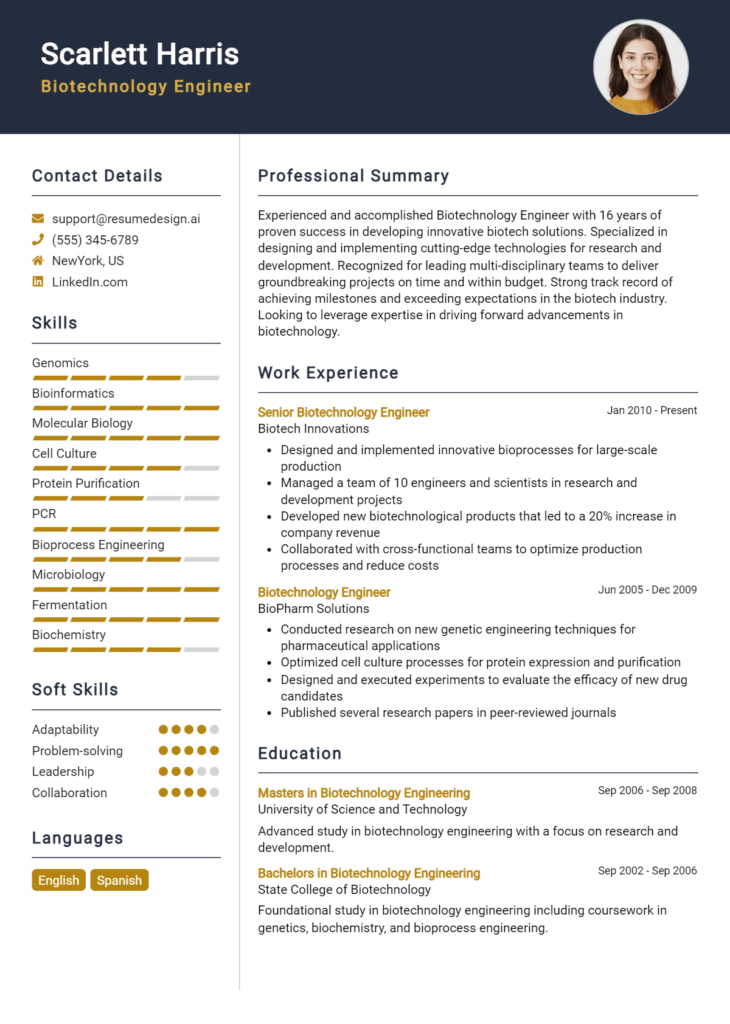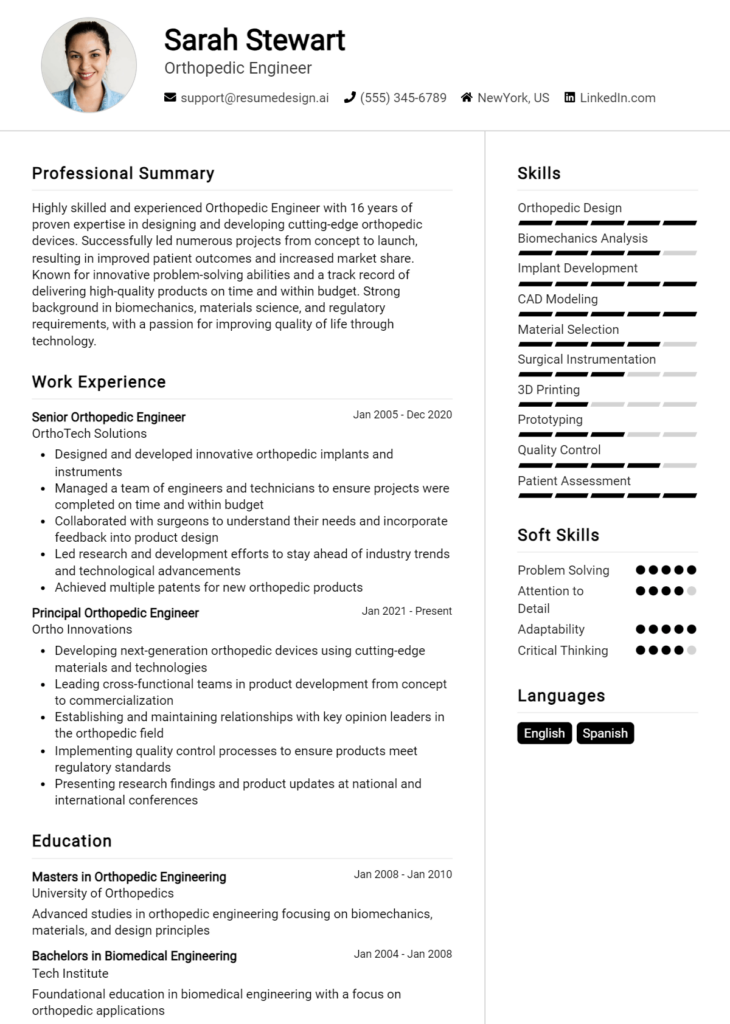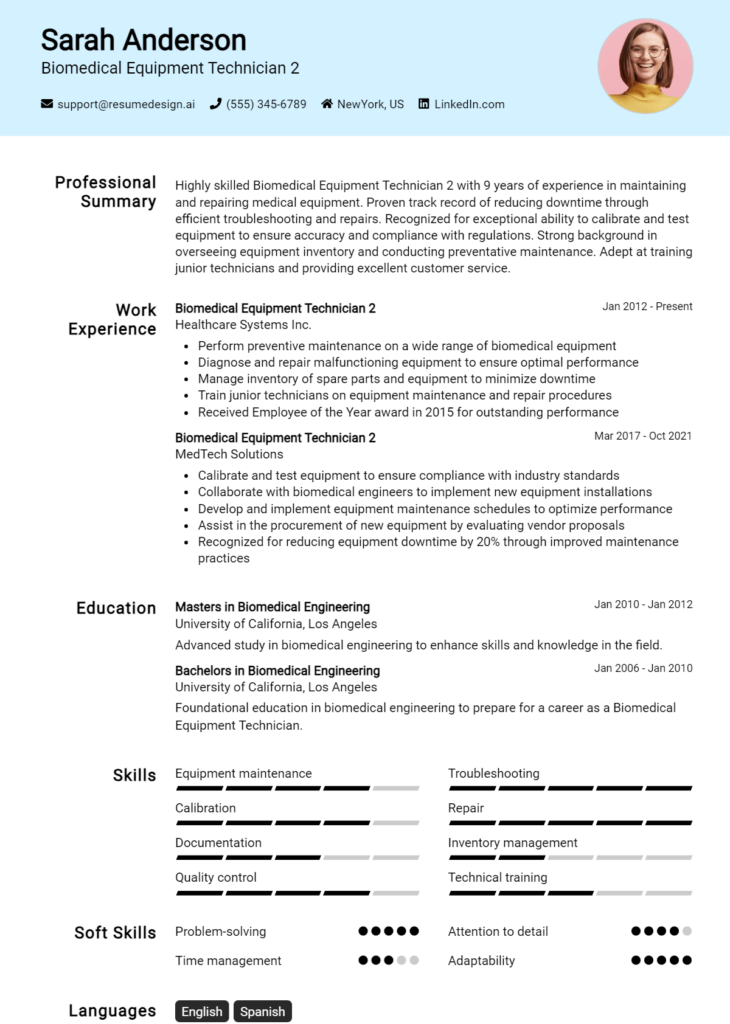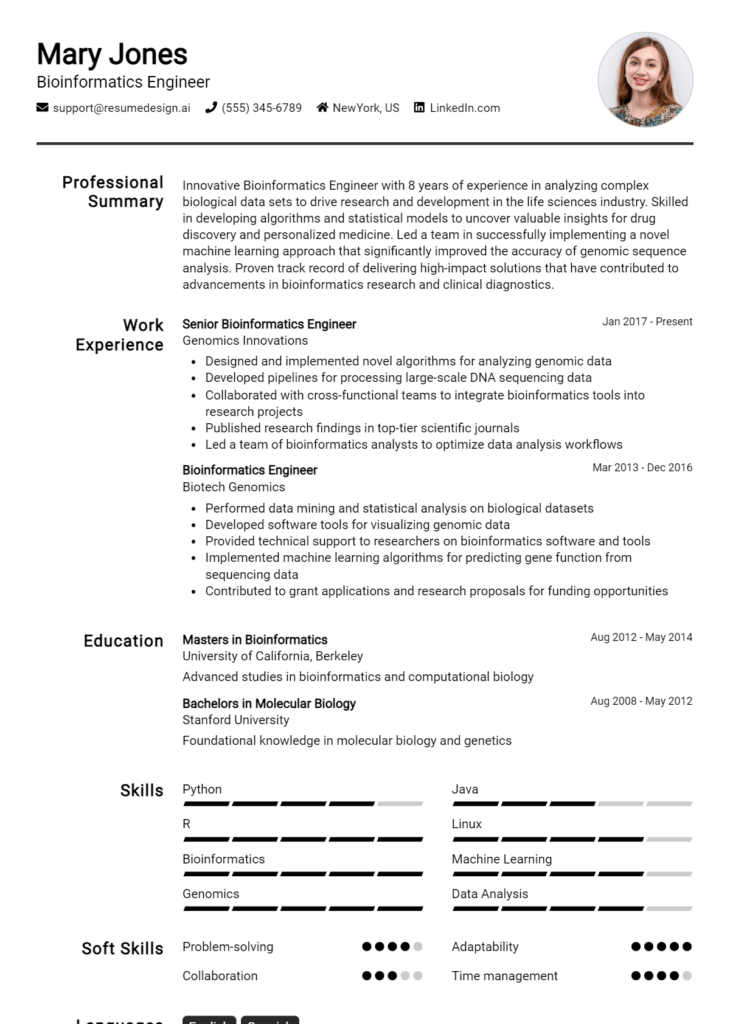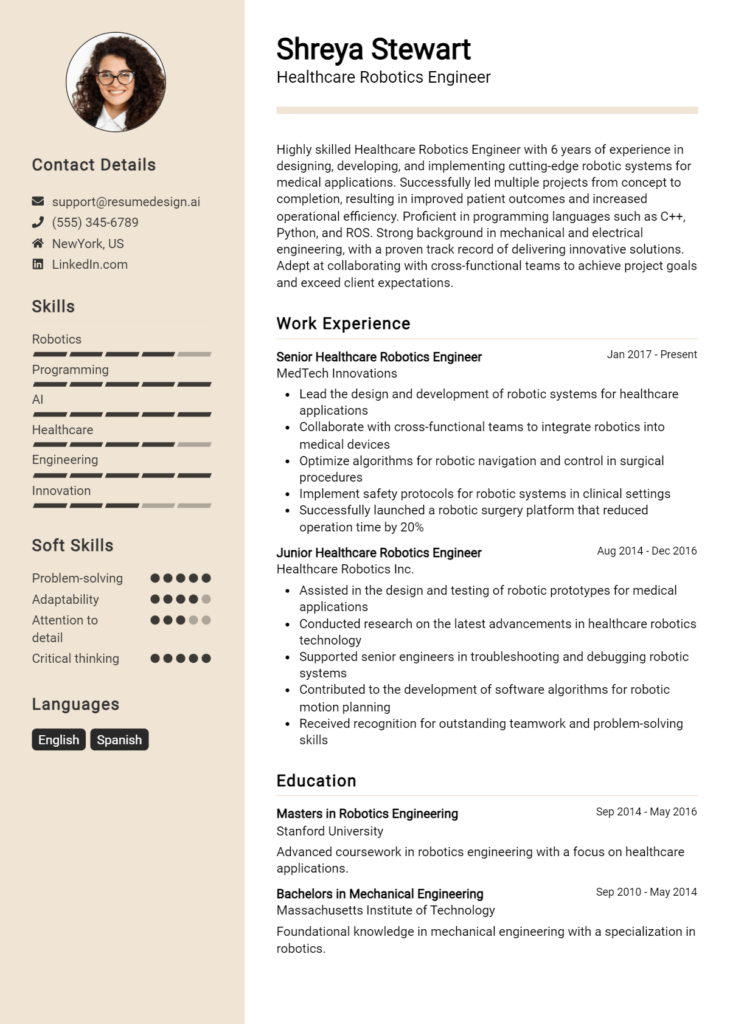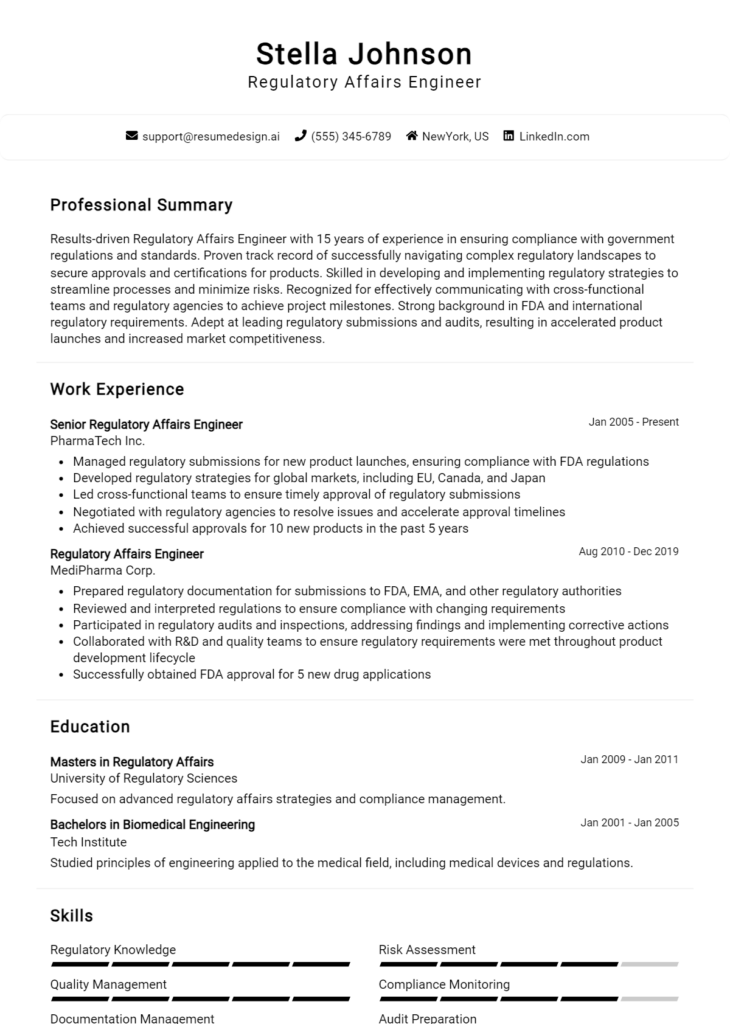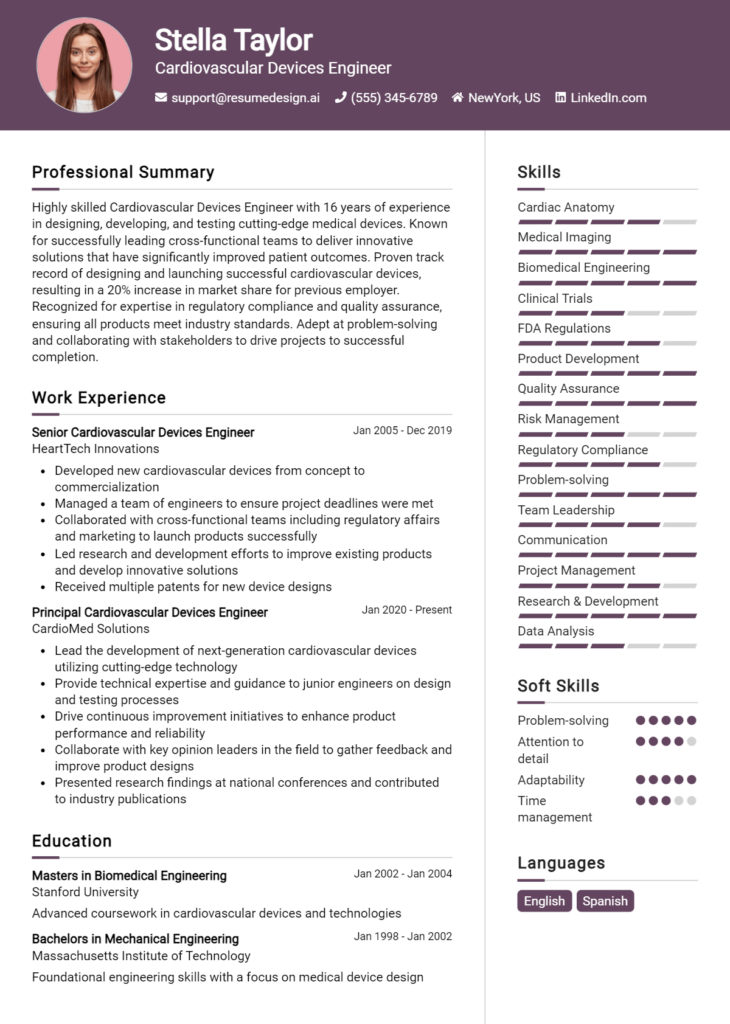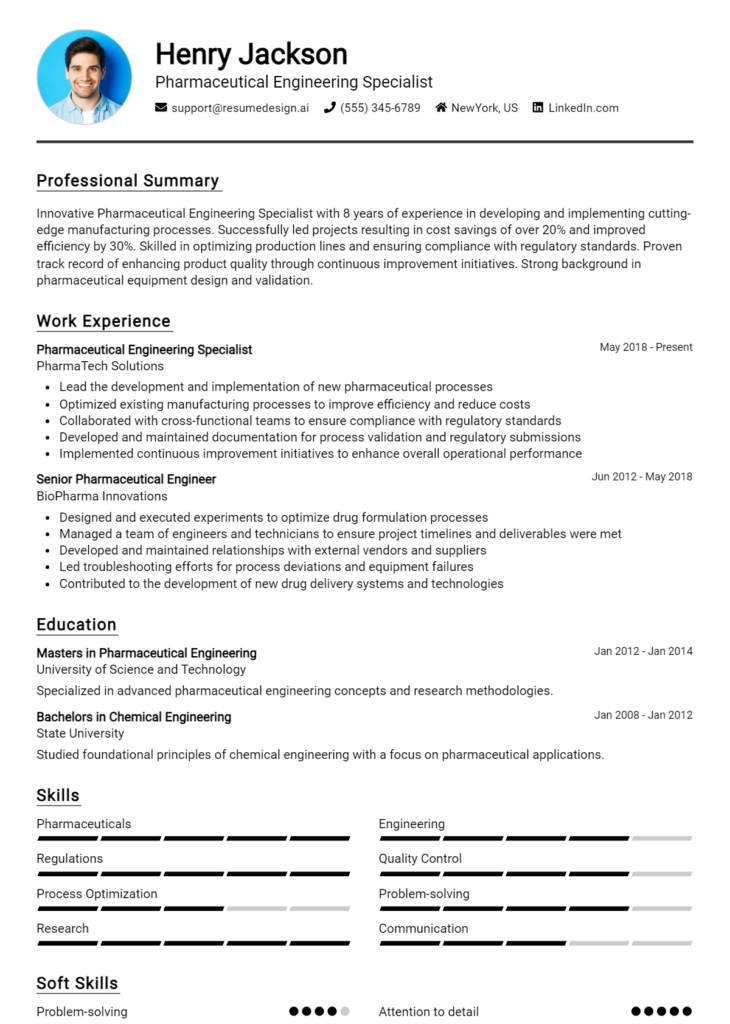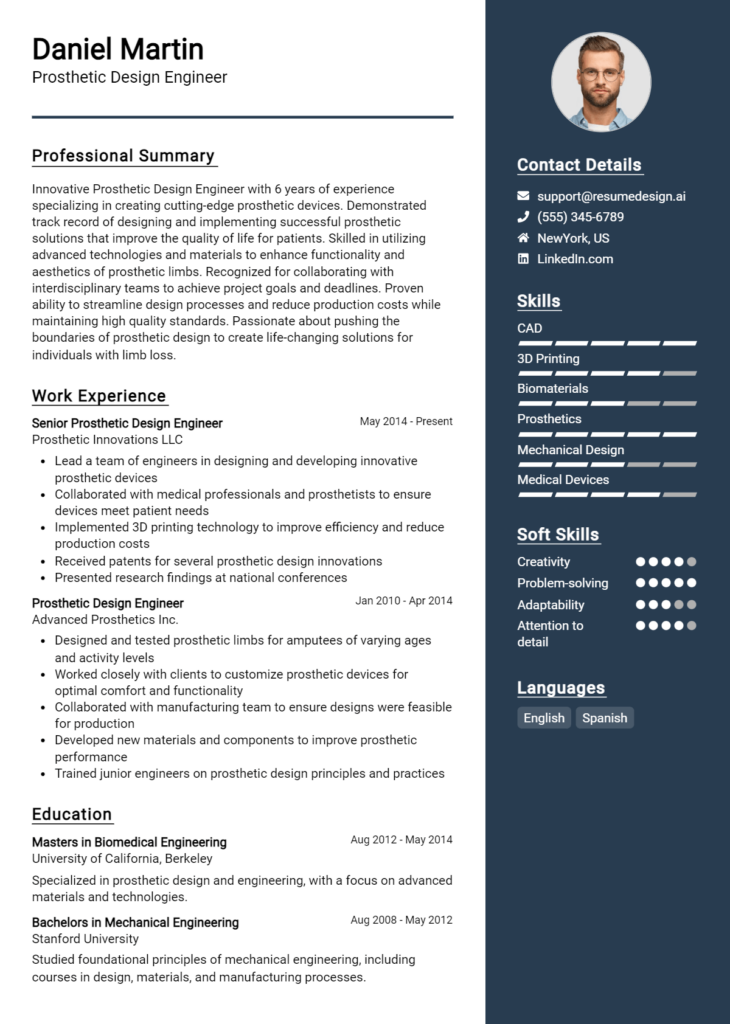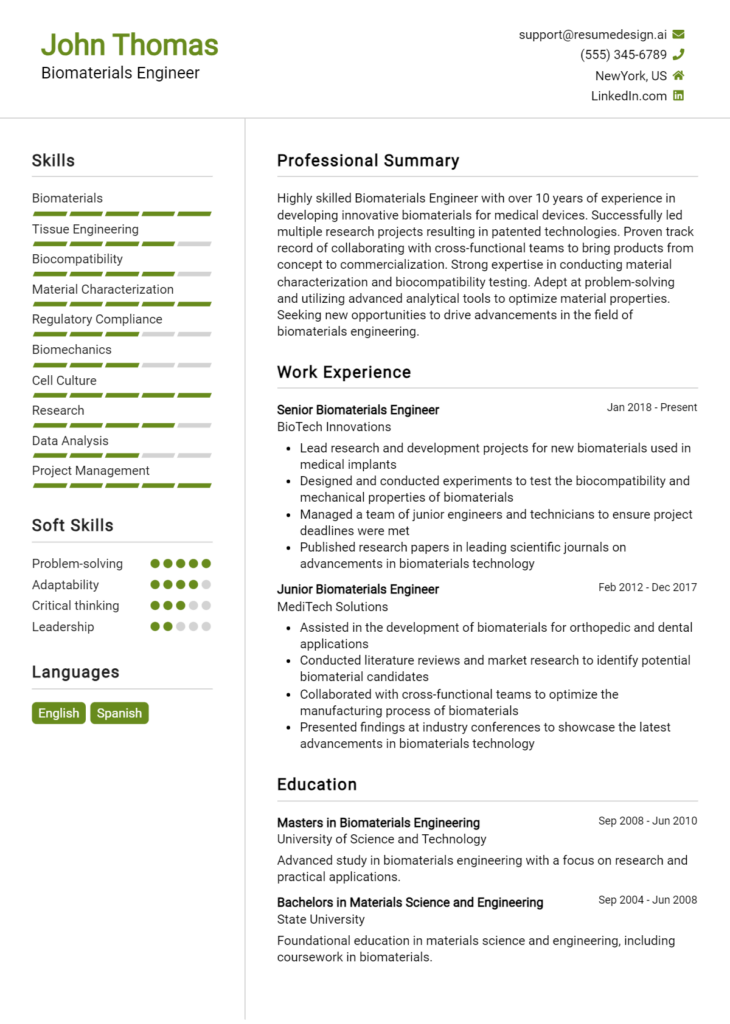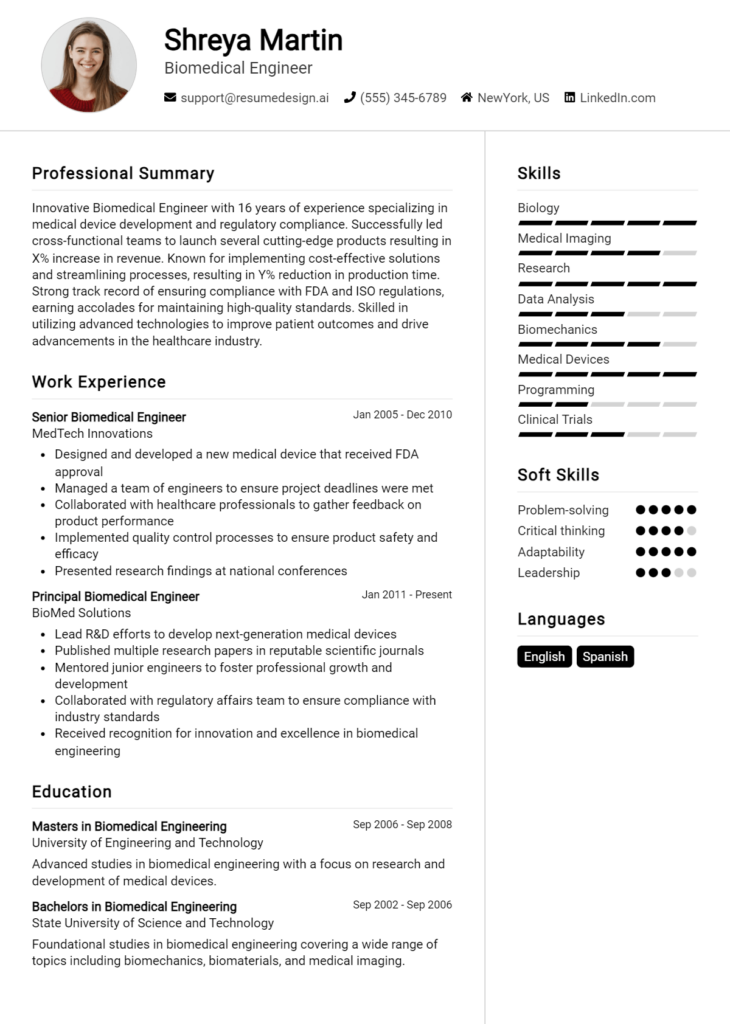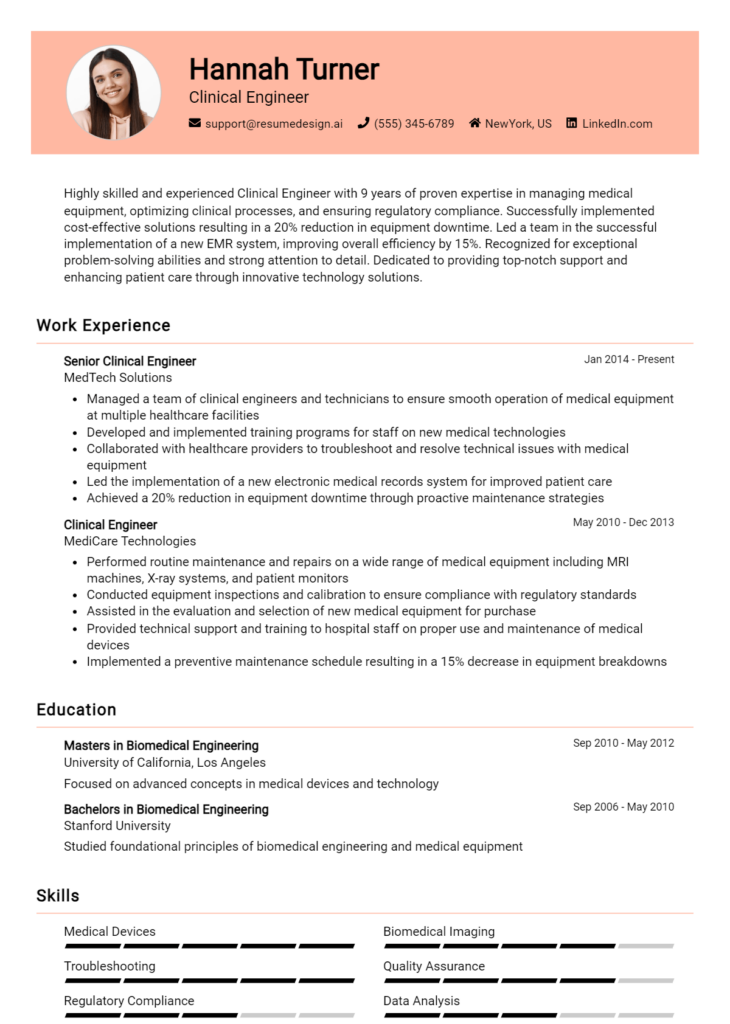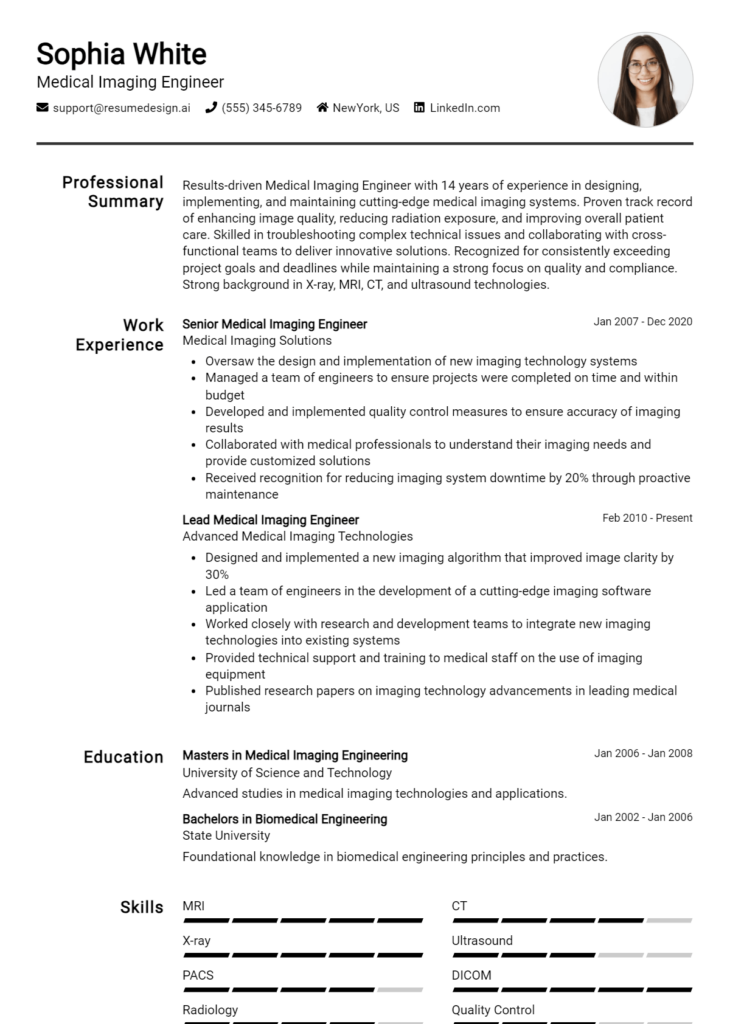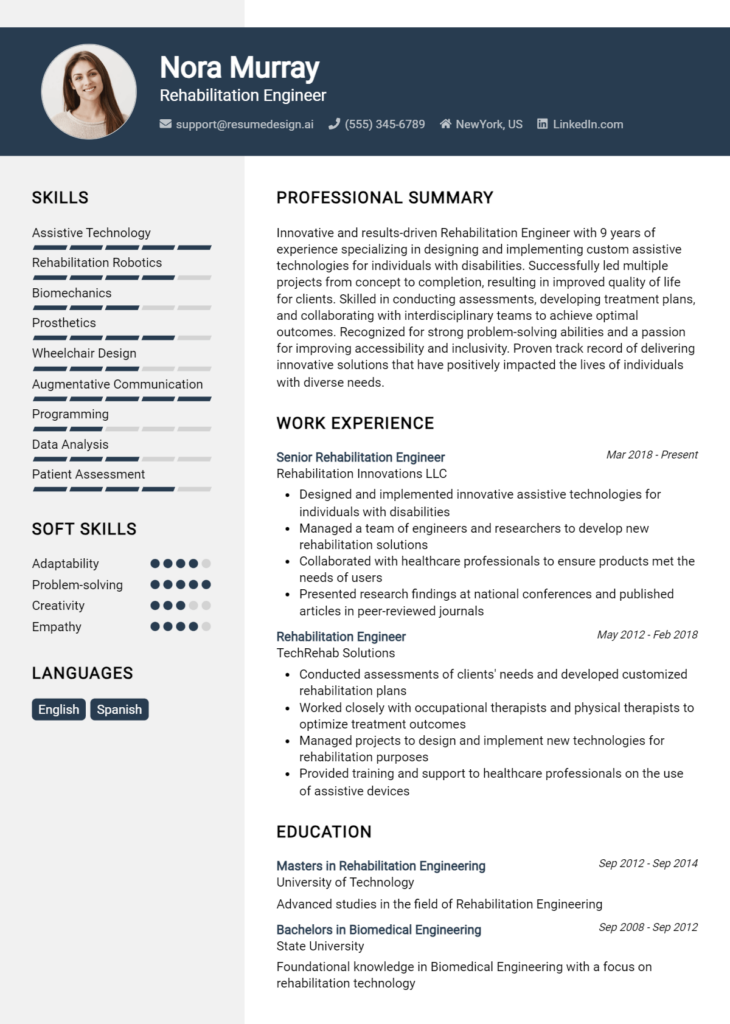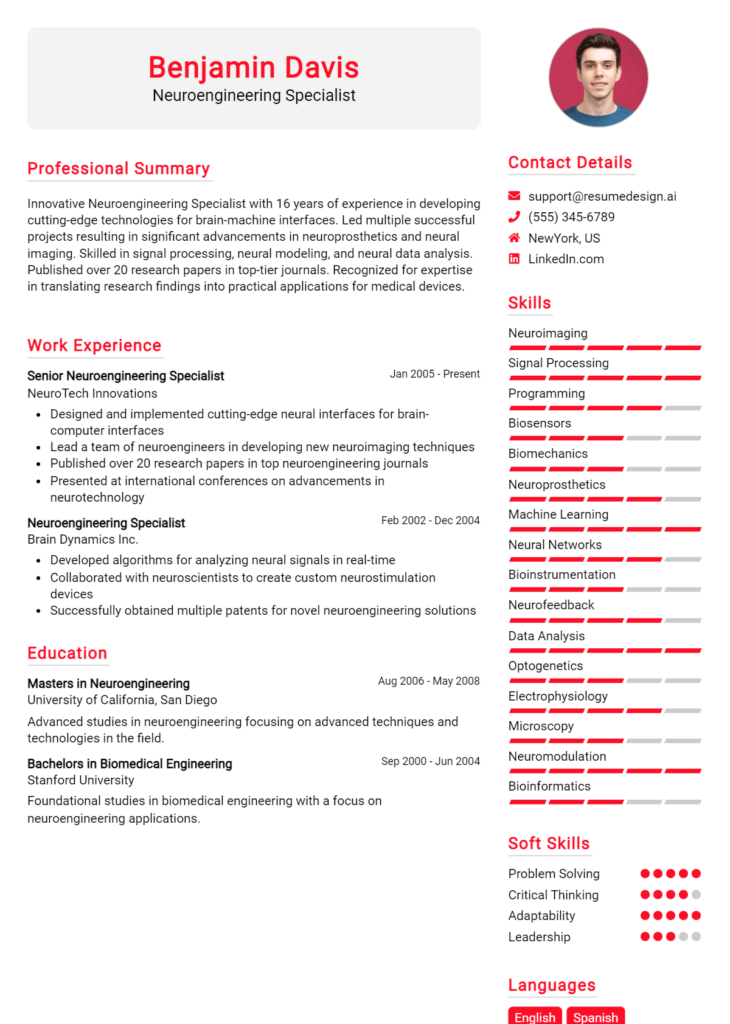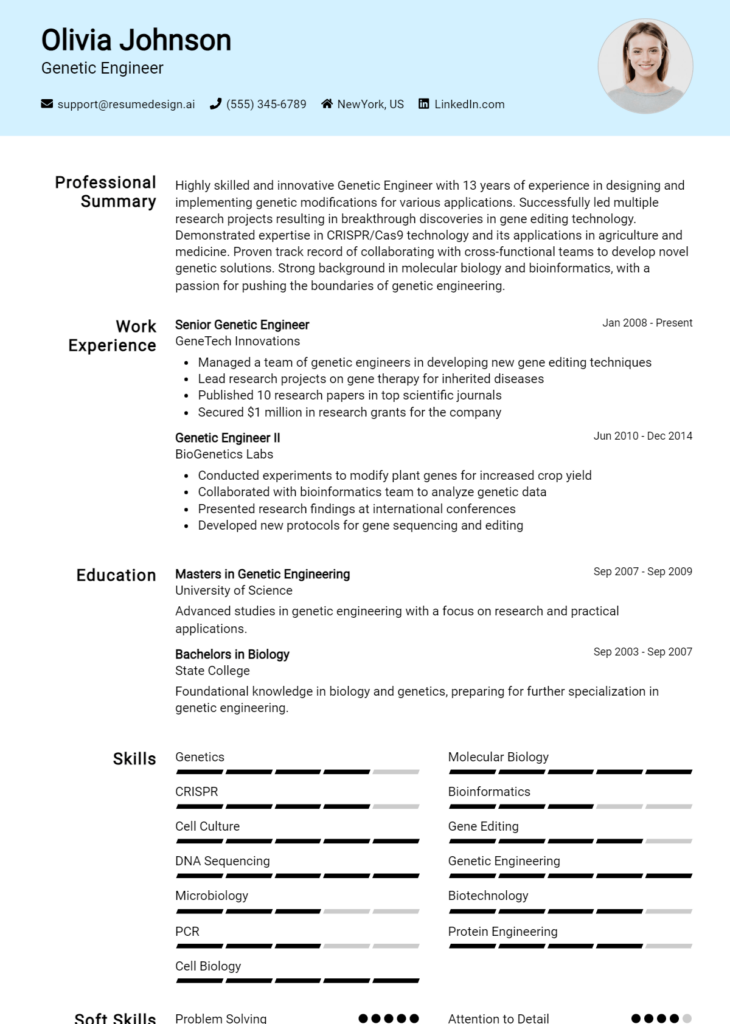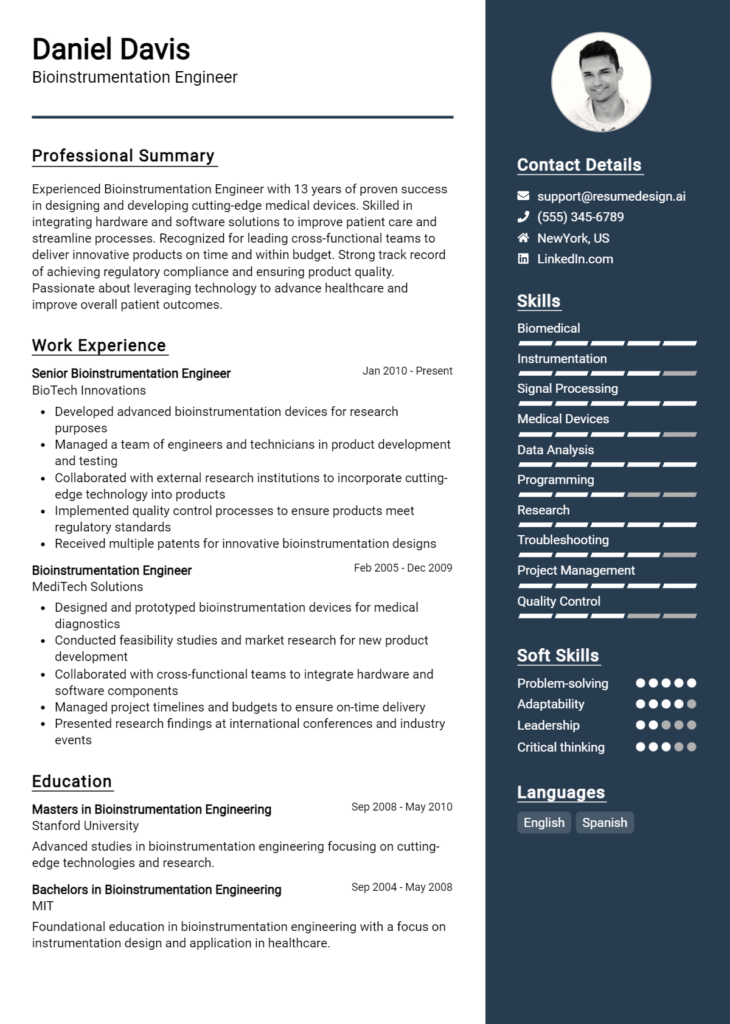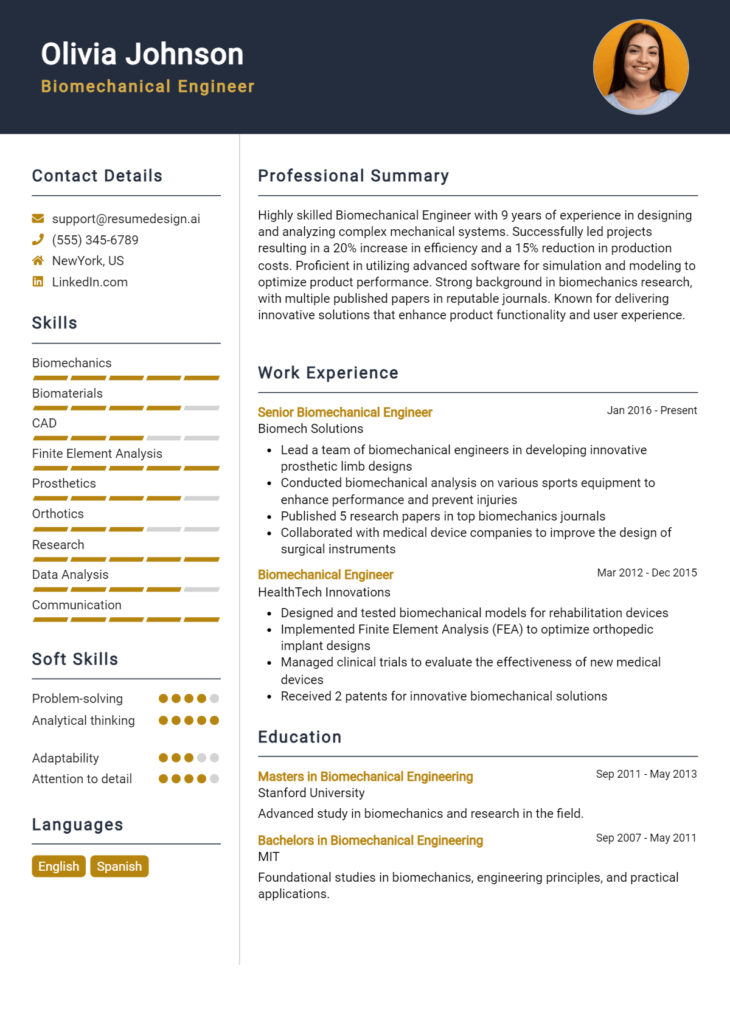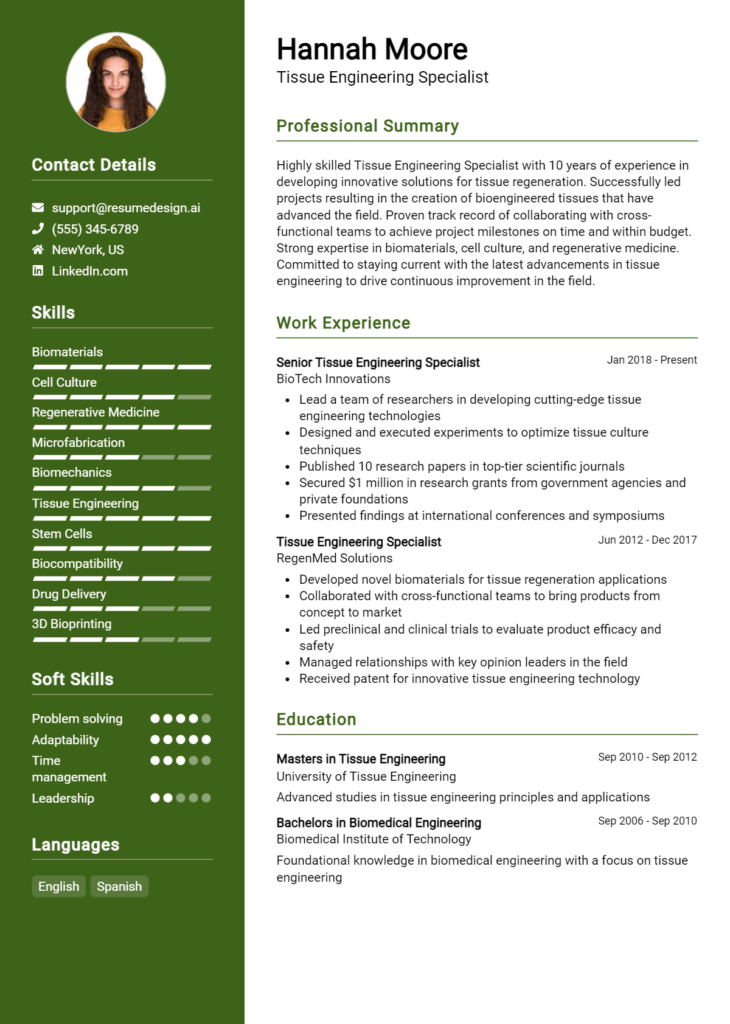Medical Device Engineer Core Responsibilities
A Medical Device Engineer is pivotal in designing, developing, and testing medical devices, requiring a blend of technical expertise, operational insight, and problem-solving skills. This role acts as a bridge between engineering, regulatory affairs, and manufacturing, ensuring that devices meet stringent safety and efficacy standards. Effective communication and collaboration across departments are essential to align product development with organizational goals. A well-structured resume can effectively highlight these qualifications, showcasing the candidate's ability to contribute significantly to the company’s success.
Common Responsibilities Listed on Medical Device Engineer Resume
- Design and develop innovative medical devices and systems.
- Conduct product testing and validation to ensure compliance with regulatory standards.
- Collaborate with cross-functional teams, including R&D, quality assurance, and manufacturing.
- Analyze and resolve technical issues throughout the product lifecycle.
- Document design specifications, testing procedures, and regulatory submissions.
- Participate in risk management and quality assurance processes.
- Stay updated on industry trends and advancements in medical technology.
- Support clinical trials and gather user feedback for product improvements.
- Assist in troubleshooting and maintenance of medical devices in the field.
- Provide training and technical support to internal teams and end-users.
High-Level Resume Tips for Medical Device Engineer Professionals
In the competitive field of medical device engineering, a well-crafted resume is not just a document—it's a powerful marketing tool that can open doors to exciting career opportunities. As the first impression a candidate makes on a potential employer, your resume needs to effectively communicate both your technical skills and significant achievements. A strong resume will not only highlight your qualifications but also demonstrate your understanding of the medical device industry. This guide will provide practical and actionable resume tips specifically tailored for Medical Device Engineer professionals, ensuring you stand out in a crowded job market.
Top Resume Tips for Medical Device Engineer Professionals
- Tailor your resume to each job application by closely aligning your skills and experiences with the specific requirements listed in the job description.
- Showcase relevant experience by detailing projects and roles that specifically relate to medical device design, development, and compliance.
- Quantify your achievements wherever possible, using metrics to demonstrate the impact of your work, such as improved product performance or reduced development time.
- Highlight industry-specific skills, such as knowledge of FDA regulations, ISO standards, and quality management systems that are crucial in medical device engineering.
- Include keywords from the job description to help your resume pass through Applicant Tracking Systems (ATS) and reach hiring managers.
- Utilize a clear and professional format that enhances readability, making sure to use bullet points for easy scanning of your experiences and skills.
- Incorporate a summary statement at the top of your resume that encapsulates your professional identity and key strengths related to medical devices.
- Don't forget to mention any certifications or continuous education relevant to the field, such as Six Sigma or project management certifications.
- Keep your resume concise, ideally one to two pages, focusing on the most relevant experiences and skills that align with the medical device industry.
By implementing these tips, you can significantly enhance the effectiveness of your resume, increasing your chances of landing a job in the medical device engineering field. A well-structured and targeted resume not only showcases your qualifications but also demonstrates your commitment to the industry, making you a compelling candidate in a highly specialized area.
Why Resume Headlines & Titles are Important for Medical Device Engineer
In the competitive field of medical device engineering, a well-crafted resume headline or title serves as a critical first impression. It encapsulates a candidate's key qualifications and strengths in a concise format, allowing hiring managers to quickly gauge their fit for the role. A strong headline can immediately grab attention, making it easier for the candidate to stand out among a sea of applicants. Therefore, the headline should be relevant, impactful, and directly related to the specific position being applied for, ensuring that it aligns with the needs of the employer while showcasing the candidate's unique value proposition.
Best Practices for Crafting Resume Headlines for Medical Device Engineer
- Keep it concise—aim for 8-12 words at most.
- Use relevant keywords that match the job description.
- Highlight specific skills or experiences pertinent to the role.
- Incorporate measurable achievements or certifications when possible.
- Avoid jargon; use clear and straightforward language.
- Tailor the headline for each application to reflect the job's requirements.
- Focus on the value you bring to potential employers.
- Use action-oriented language to convey proactivity and impact.
Example Resume Headlines for Medical Device Engineer
Strong Resume Headlines
Innovative Medical Device Engineer with 5+ Years in Product Development
Results-Driven Engineer Specializing in Regulatory Compliance and Quality Assurance
Experienced Biomedical Engineer Focused on Cutting-Edge Surgical Devices
Proven Track Record in Designing User-Centric Medical Solutions
Weak Resume Headlines
Engineer Looking for Opportunities
Medical Device Engineer
Seeking a Job in Engineering
The strong headlines are effective because they immediately convey specific skills, experiences, and accomplishments relevant to the medical device engineering field, making the candidate more appealing to employers. In contrast, the weak headlines lack detail and specificity, failing to highlight the candidate’s unique qualifications or motivation for the position. This makes them less memorable and impactful, ultimately diminishing the candidate's chances of standing out in a competitive job market.
Writing an Exceptional Medical Device Engineer Resume Summary
A well-crafted resume summary is crucial for a Medical Device Engineer as it serves as a powerful introduction to a candidate's qualifications and experiences. It acts as a hook that captures the attention of hiring managers, providing them with a quick yet impactful overview of the applicant's key skills, relevant experience, and notable accomplishments. A strong summary should be concise and tailored specifically to the job being applied for, ensuring that it resonates with the requirements and expectations of the role. By effectively highlighting the most pertinent information, candidates can set themselves apart in a competitive field, increasing their chances of landing an interview.
Best Practices for Writing a Medical Device Engineer Resume Summary
- Quantify achievements: Use numbers and statistics to demonstrate the impact of your work.
- Focus on key skills: Highlight specific technical and soft skills that are relevant to the position.
- Tailor the summary: Customize your summary for each job application to align with the job description.
- Use industry terminology: Incorporate relevant jargon and phrases that reflect your expertise in medical devices.
- Keep it concise: Aim for 3-5 sentences that pack a punch without overwhelming the reader.
- Highlight certifications: Mention any relevant certifications that enhance your qualifications.
- Showcase problem-solving abilities: Briefly illustrate your capacity to tackle industry-specific challenges.
- Reflect your passion: Convey enthusiasm for the medical device field and your commitment to improving patient outcomes.
Example Medical Device Engineer Resume Summaries
Strong Resume Summaries
Results-driven Medical Device Engineer with over 7 years of experience in developing innovative surgical instruments. Successfully led a project that reduced production costs by 30% while improving product quality, resulting in a 15% increase in customer satisfaction ratings.
Detail-oriented Medical Device Engineer skilled in regulatory compliance and quality assurance. Played a key role in obtaining FDA approval for three new medical devices, ensuring adherence to stringent industry standards and enhancing market competitiveness.
Dynamic Medical Device Engineer with a proven track record in designing and testing cardiovascular devices. Achieved a 25% reduction in time-to-market for new products through streamlined testing processes and collaboration with cross-functional teams.
Weak Resume Summaries
Medical Device Engineer with experience in the industry. Looking for a new opportunity to grow my career.
I am a skilled engineer interested in making medical devices. I have worked on various projects and am eager to learn more.
The strong resume summaries are considered effective because they provide specific details about achievements, demonstrate quantifiable results, and directly align with the skills and experiences relevant to the Medical Device Engineer role. In contrast, the weak summaries lack specificity and measurable outcomes, making them generic and unremarkable. Without clear connections to the job requirements, these summaries fail to engage hiring managers or highlight the candidate's unique qualifications.
Work Experience Section for Medical Device Engineer Resume
The work experience section of a Medical Device Engineer resume is vital in showcasing a candidate's technical skills, project management abilities, and commitment to delivering high-quality products. This section serves as a platform to highlight not only the candidate's hands-on experience with medical devices but also their capacity to lead teams and collaborate effectively with cross-functional groups. By quantifying achievements and aligning past experiences with industry standards, candidates can effectively demonstrate their value to potential employers and differentiate themselves in a competitive job market.
Best Practices for Medical Device Engineer Work Experience
- Focus on relevant experience in the medical device field, emphasizing specific technologies and regulatory knowledge.
- Quantify achievements with metrics such as project completion times, cost reductions, or product performance improvements.
- Highlight leadership roles and team collaborations, showcasing skills in project management and stakeholder engagement.
- Use action verbs to describe responsibilities and accomplishments, making the experience dynamic and engaging.
- Align experiences with industry standards and regulations, such as ISO 13485 or FDA guidelines, to demonstrate compliance knowledge.
- Incorporate technical skills, such as proficiency in CAD software, software development, or quality assurance methodologies.
- Tailor the work experience section to the job description, emphasizing the most relevant experiences to the position applied for.
- Include continuous learning and professional development efforts, such as certifications or training related to medical devices.
Example Work Experiences for Medical Device Engineer
Strong Experiences
- Led a cross-functional team in the development of a new insulin pump, resulting in a 30% reduction in production costs and a 25% increase in user satisfaction ratings.
- Conducted rigorous testing and validation for a heart monitor device that achieved FDA approval six months ahead of schedule.
- Implemented a quality management system that reduced product defects by 40%, significantly improving compliance with ISO 13485 standards.
- Collaborated with software engineers to enhance the user interface of a medical imaging device, leading to a 50% decrease in training time for healthcare professionals.
Weak Experiences
- Worked on medical devices.
- Participated in team meetings and discussions.
- Assisted in testing and validation processes.
- Helped with project documentation.
The examples listed above illustrate a clear distinction between strong and weak experiences. Strong experiences provide specific, quantifiable outcomes and demonstrate a proactive approach to technical leadership and collaboration. They highlight the candidate's impact on projects and their ability to deliver results in a competitive industry. Conversely, weak experiences lack detail and specificity, failing to convey the candidate's contribution or the significance of their roles, ultimately diminishing their appeal to potential employers.
Education and Certifications Section for Medical Device Engineer Resume
The education and certifications section of a Medical Device Engineer resume is crucial as it showcases the candidate's academic foundation and professional qualifications. This section not only highlights relevant degrees but also emphasizes industry-recognized certifications and specialized training that demonstrate a commitment to continuous learning. By providing detailed information on relevant coursework and certifications, candidates can significantly enhance their credibility and align themselves with the specific requirements of the job role, making them stand out in a competitive field.
Best Practices for Medical Device Engineer Education and Certifications
- Prioritize degrees in biomedical engineering, mechanical engineering, or related fields.
- Include certifications from recognized bodies such as the FDA, ISO, or other relevant industry organizations.
- Highlight specialized training that pertains to medical device design, testing, or regulatory compliance.
- List relevant coursework that demonstrates knowledge in key areas like materials science or device manufacturing.
- Be specific about the level of certification, indicating if it is a certification or a specialized training program.
- Keep the section concise but detailed enough to give a clear picture of qualifications.
- Update regularly to reflect any new certifications or educational achievements.
- Use clear formatting to make it easy for hiring managers to scan the qualifications quickly.
Example Education and Certifications for Medical Device Engineer
Strong Examples
- Bachelor of Science in Biomedical Engineering, XYZ University, 2020
- Certified Quality Engineer (CQE), American Society for Quality, 2022
- Coursework in Medical Device Design and Regulatory Affairs, ABC Online Academy, 2021
- Training in ISO 13485:2016 Standard for Quality Management Systems, 2023
Weak Examples
- Bachelor of Arts in English Literature, XYZ University, 2015
- Certification in Basic First Aid, Red Cross, 2018
- Coursework in Creative Writing, ABC College, 2016
- Old certification in Medical Device Safety from 2005 (no longer recognized)
The strong examples are considered relevant because they directly relate to the skills and knowledge required for a Medical Device Engineer position, showcasing both educational background and specialized certifications that align with industry standards. In contrast, the weak examples highlight qualifications that do not pertain to the medical device field, indicating a lack of focus on the necessary competencies required for the role, which could diminish a candidate’s appeal to potential employers.
Top Skills & Keywords for Medical Device Engineer Resume
In the competitive field of medical device engineering, having the right skills is crucial for standing out in your resume. Employers seek candidates who not only possess technical expertise but also demonstrate a robust set of soft skills that enhance team collaboration and project success. A well-crafted resume that highlights both hard and soft skills can significantly improve an applicant's chances of securing an interview. Prospective employers in the medical device sector are looking for individuals who can navigate complex regulatory environments, innovate solutions, and work effectively within multidisciplinary teams. By showcasing your skills prominently, you can effectively communicate your qualifications and readiness for the challenges of this rewarding profession.
Top Hard & Soft Skills for Medical Device Engineer
Soft Skills
- Strong communication skills
- Team collaboration
- Problem-solving abilities
- Time management
- Adaptability
- Critical thinking
- Attention to detail
- Creativity and innovation
- Leadership qualities
- Ethical judgment and integrity
- Customer-focused mindset
- Conflict resolution
Hard Skills
- Knowledge of FDA regulations and compliance
- Proficiency in CAD software (e.g., SolidWorks, AutoCAD)
- Experience with design control processes
- Familiarity with ISO 13485 standards
- Prototyping and testing methodologies
- Understanding of materials science
- Statistical analysis and data interpretation
- Knowledge of electrical and mechanical systems
- Experience with risk management tools (e.g., FMEA, DFMEA)
- Programming skills (e.g., C++, MATLAB)
- Quality assurance and control processes
- Familiarity with medical terminology
- Project management tools and techniques
- Knowledge of biocompatibility testing
- Experience with clinical trial design
- Software development lifecycle (SDLC)
- Proficiency in simulation tools
For more tips on enhancing your resume with the right skills and effectively showcasing your work experience, explore the provided resources.
Stand Out with a Winning Medical Device Engineer Cover Letter
As a highly skilled Medical Device Engineer with over five years of experience in designing and developing innovative medical technologies, I am excited to apply for the position at [Company Name]. My background in biomedical engineering, combined with extensive hands-on experience in product development and regulatory compliance, has equipped me with the technical expertise and problem-solving abilities necessary to contribute effectively to your team. I am particularly drawn to [Company Name] due to its commitment to advancing healthcare through cutting-edge solutions, and I am eager to be part of such an impactful mission.
In my previous role at [Previous Company Name], I led a cross-functional team in the development of a new cardiac monitoring device that improved patient outcomes by providing real-time data analytics. My responsibilities included conducting feasibility studies, managing design controls, and ensuring adherence to FDA regulations and ISO standards. Collaborating closely with clinical teams allowed me to gain valuable insights into user needs, which I integrated into the design process to enhance usability and functionality. This experience has honed my ability to balance innovative design with regulatory requirements, a crucial aspect of medical device development.
I am also well-versed in employing various engineering methodologies, such as Design for Six Sigma (DFSS) and Failure Mode and Effects Analysis (FMEA), to ensure product reliability and safety. My proficiency in tools like SolidWorks and MATLAB has enabled me to create detailed prototypes and simulations, streamlining the development process and reducing time-to-market. Furthermore, my strong communication skills allow me to effectively convey complex technical information to both technical and non-technical stakeholders, fostering collaboration and ensuring project alignment.
I am excited about the opportunity to bring my unique expertise to [Company Name] and contribute to the development of life-saving medical devices. Thank you for considering my application. I look forward to the possibility of discussing how my skills and experiences align with the goals of your team.
Common Mistakes to Avoid in a Medical Device Engineer Resume
Crafting a resume as a Medical Device Engineer requires a keen understanding of both the technical skills necessary for the role and the nuances of effective resume presentation. Many candidates make avoidable mistakes that can detract from their qualifications or fail to highlight their unique contributions to the field. By being aware of these common pitfalls, you can enhance your resume and increase your chances of landing that coveted position.
Lack of Relevant Keywords: Failing to include industry-specific keywords can result in your resume being overlooked by applicant tracking systems (ATS) that filter for specific terms.
Overly Technical Language: While technical proficiency is essential, using excessive jargon can alienate non-technical reviewers. Aim for a balance that showcases your expertise while remaining accessible.
Inadequate Quantification of Achievements: Not providing measurable outcomes for your projects can make your contributions seem vague. Use metrics to illustrate your impact, such as reduced costs or improved efficiency.
Ignoring Compliance and Regulatory Knowledge: Since medical devices are heavily regulated, omitting any mention of your familiarity with standards like ISO 13485 or FDA regulations can weaken your candidacy.
Generic Objective Statements: Using a one-size-fits-all objective statement can dilute your resume. Tailor your objective to reflect your specific interest in the medical device field and the role you’re applying for.
Neglecting Soft Skills: Focusing solely on technical skills without mentioning teamwork, communication, and problem-solving abilities can present an incomplete picture of your qualifications.
Poor Formatting and Clarity: A cluttered or overly complex layout can hinder readability. Ensure your resume is clear, well-organized, and visually appealing to make a lasting impression.
Failure to Highlight Continuous Learning: The medical device industry evolves rapidly. Not mentioning ongoing education, certifications, or relevant training can suggest stagnation in your professional development.
Conclusion
As a Medical Device Engineer, your role is crucial in developing, testing, and ensuring the safety and effectiveness of medical devices that can significantly impact patient care. Throughout this article, we explored the essential skills and qualifications needed for this position, including a strong understanding of engineering principles, familiarity with regulatory standards, and the ability to collaborate with cross-functional teams. We also highlighted the importance of continuous learning and staying updated with technological advancements in the medical field.
To maximize your potential in landing a job as a Medical Device Engineer, it's vital to have a well-crafted resume that showcases your expertise and achievements in this specialized field. Take a moment to review your resume and ensure it reflects your qualifications accurately.
We encourage you to utilize the available resources to enhance your job application materials. Check out these helpful tools:
- Resume Templates to find a design that fits your style.
- Resume Builder for an easy and efficient way to create a professional resume.
- Resume Examples to get inspired by successful resumes in your field.
- Cover Letter Templates to complement your resume and make a strong impression on potential employers.
Take action today by refining your Medical Device Engineer resume and positioning yourself for success in your career!

